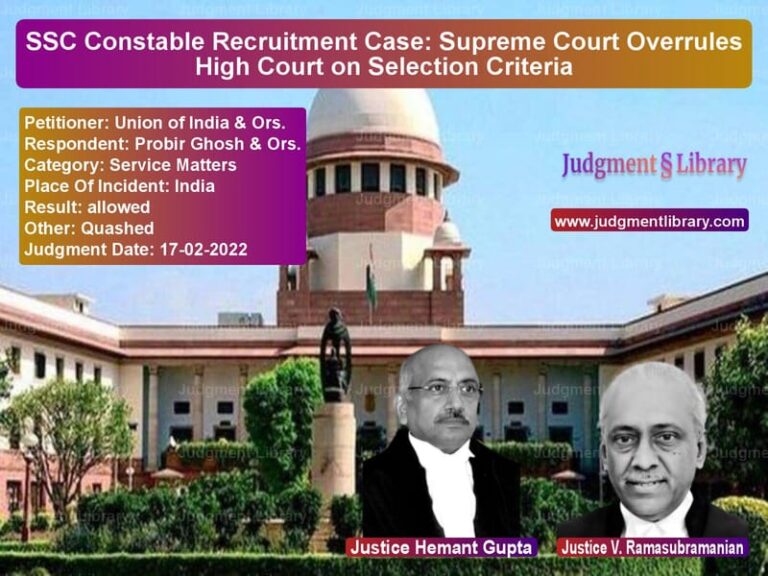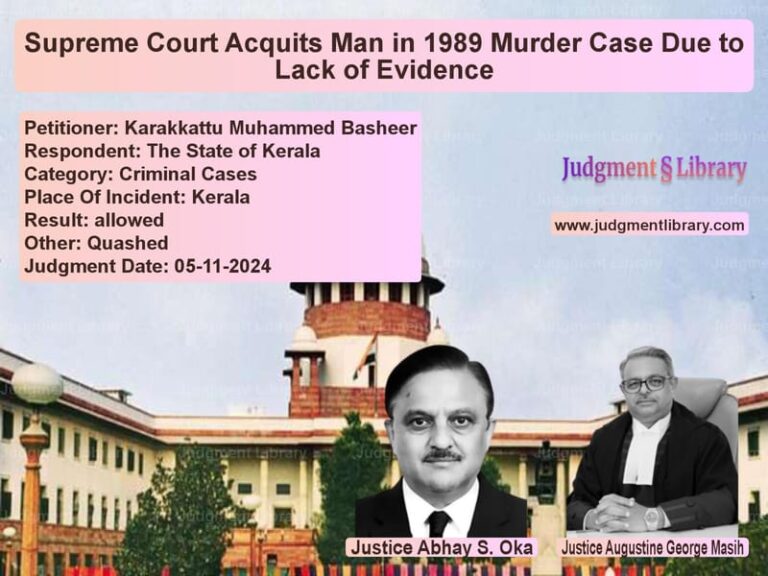Supreme Court Allows Appeal in Railway Employee Dismissal Case
The Supreme Court of India recently ruled in the case of Union of India & Ors. vs. Sharvan Kumar, allowing the appeal filed by the Union of India against a Calcutta High Court judgment. The case revolved around the dismissal of a railway employee due to alleged negligence, and whether the disciplinary proceedings were valid after the expiry of a time limit set by the Central Administrative Tribunal (CAT).
Background of the Case
The case pertained to an incident on 9th November 2005, when Sharvan Kumar, an Electric Locomotive Driver with South Eastern Railway, allegedly failed to stop his locomotive at a signal, endangering railway operations. The railway authorities conducted a joint inquiry and concluded that the accused had manipulated brake adjustment rods in an attempt to justify his failure to stop the locomotive. Consequently, disciplinary action was initiated against him.
On 23rd February 2006, the Disciplinary Authority imposed the penalty of removal from service. However, on appeal, the Appellate Authority modified the penalty to downgrading his pay to the lowest stage in the scale of Rs. 4,000-6,000. The Revisional Authority upheld this penalty. Dissatisfied, the employee approached the CAT, which found procedural lapses in the disciplinary proceedings and ordered a reconsideration of the matter within two months.
Petitioner’s Arguments (Union of India & Ors.)
The Union of India, representing the railway authorities, argued:
- The employee’s negligence was evident as he failed to stop the locomotive, endangering railway safety.
- The disciplinary proceedings followed due process, and the CAT’s order only required reconsideration, not a complete abatement of proceedings.
- The delay in completing the proceedings was procedural and did not affect the merits of the case.
- The High Court erred in treating the proceedings as null and void solely based on the expiration of the two-month deadline set by CAT.
Respondent’s Arguments (Sharvan Kumar)
The respondent, Sharvan Kumar, contended:
- The disciplinary proceedings were vitiated due to bias, as one of the members of the inquiry committee later acted as the Disciplinary Authority.
- The CAT had set a strict time frame for the proceedings to be completed within two months, and failure to adhere to this rendered the proceedings invalid.
- The order of removal from service passed after the expiry of the CAT’s prescribed period was a nullity.
- The High Court was correct in ordering his reinstatement with 50% back wages.
Supreme Court’s Observations
The Supreme Court, after reviewing the matter, made the following key observations:
- Fixing a time limit for completing disciplinary proceedings is intended to ensure expeditious disposal, but failure to meet the deadline does not automatically nullify the proceedings.
- The High Court erroneously assumed that the disciplinary proceedings abated after the expiry of the prescribed period.
- The absence of an explicit provision in the CAT’s order declaring automatic abatement meant that the proceedings could continue beyond the time limit.
- Strictures passed against the Disciplinary Authority by the High Court were unwarranted.
Key Legal Precedents Considered
The Supreme Court relied on several legal precedents, including:
- Mahanth Ram Das v. Ganga Das (1961): Held that courts have the inherent power to extend deadlines set by judicial orders.
- State of Maharashtra v. Kashi Ram (2006): Stressed that procedural delays alone do not vitiate proceedings unless there is substantial prejudice.
- Union of India v. Prafulla Kumar Samal (1979): Affirmed that disciplinary proceedings must follow due process and principles of natural justice.
Final Judgment
The Supreme Court ruled:
- The High Court’s judgment quashing the disciplinary proceedings was set aside.
- The CAT’s decision allowing the reconsideration of the disciplinary action was upheld.
- The employee was granted the liberty to appeal against the final disciplinary order if he wished.
- The direction to reinstate the respondent with 50% back wages was quashed.
Implications of the Ruling
The Supreme Court’s ruling has significant implications:
- Fixing a time limit for proceedings does not automatically nullify disciplinary actions.
- Courts should focus on substantive justice rather than procedural technicalities.
- Strict time frames in disciplinary proceedings should be enforced flexibly.
- Disciplinary authorities must adhere to principles of fairness but are not bound by arbitrary procedural deadlines.
The judgment reinforces the need for a balanced approach in disciplinary matters, ensuring procedural compliance without allowing technicalities to hinder substantive justice.
Petitioner Name: Union of India & Ors..Respondent Name: Sharvan Kumar.Judgment By: Justice Dinesh Maheshwari, Justice Krishna Murari.Place Of Incident: South Eastern Railway, India.Judgment Date: 05-07-2022.
Don’t miss out on the full details! Download the complete judgment in PDF format below and gain valuable insights instantly!
Download Judgment: union-of-india-&-ors-vs-sharvan-kumar-supreme-court-of-india-judgment-dated-05-07-2022.pdf
Directly Download Judgment: Directly download this Judgment
See all petitions in Disciplinary Proceedings
See all petitions in Employment Disputes
See all petitions in Judgment by Dinesh Maheshwari
See all petitions in Judgment by Krishna Murari
See all petitions in allowed
See all petitions in Quashed
See all petitions in supreme court of India judgments July 2022
See all petitions in 2022 judgments
See all posts in Service Matters Category
See all allowed petitions in Service Matters Category
See all Dismissed petitions in Service Matters Category
See all partially allowed petitions in Service Matters Category







